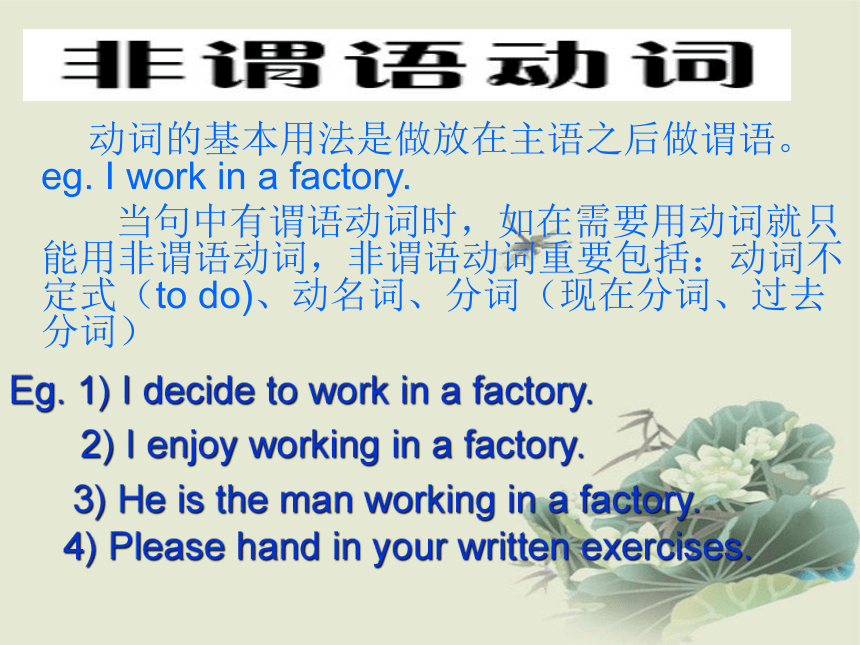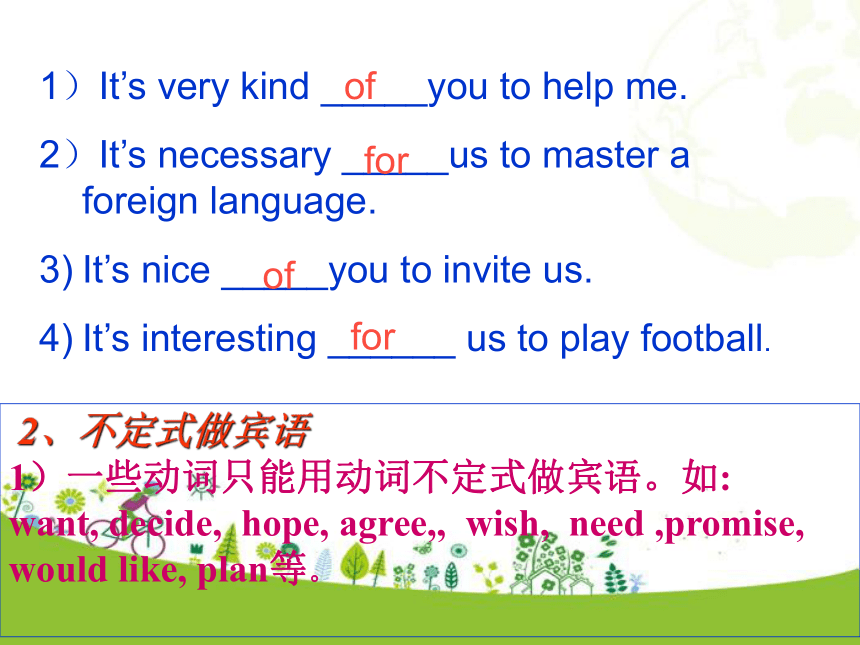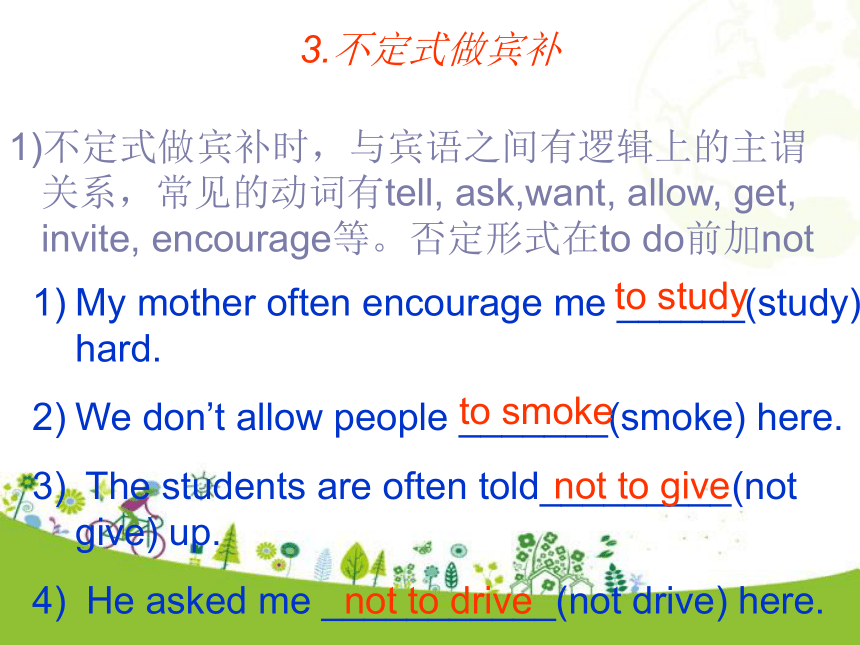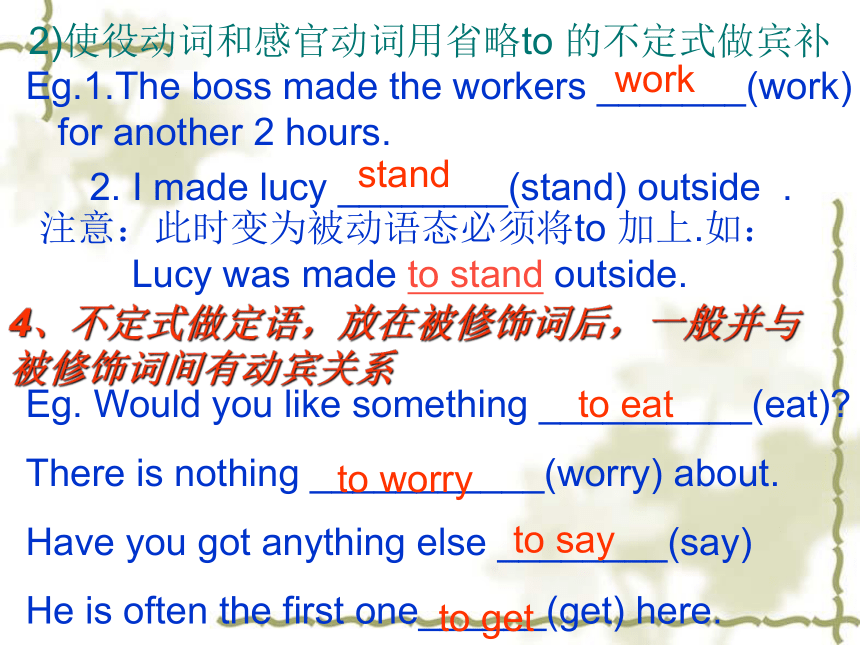中考英语非谓语动词专题复习课件(共19张PPT)
文档属性
| 名称 | 中考英语非谓语动词专题复习课件(共19张PPT) |  | |
| 格式 | zip | ||
| 文件大小 | 575.5KB | ||
| 资源类型 | 试卷 | ||
| 版本资源 | 人教新目标(Go for it)版 | ||
| 科目 | 英语 | ||
| 更新时间 | 2021-05-27 17:20:27 | ||
图片预览







文档简介
(共19张PPT)
非谓语动词
动词的基本用法是做放在主语之后做谓语。eg.
I
work
in
a
factory.
当句中有谓语动词时,如在需要用动词就只能用非谓语动词,非谓语动词重要包括:动词不定式(to
do)、动名词、分词(现在分词、过去分词)
Eg.
1)
I
decide
to
work
in
a
factory.
2)
I
enjoy
working
in
a
factory.
3)
He
is
the
man
working
in
a
factory.
4)
Please
hand
in
your
written
exercises.
一、动词不定式
1、动词不定式做主语
动词不定式作主语时,常用it做形式主语,而将真正的主语放在句末.其结构是
It’s
+adj.+of/
for
sb
+
to
do.
Eg
.To
learn
English
well
is
useful
It’s
useful
to
learn
well.
注意:此时用of还是用for
关键是看形容词形容的是什么,如果是形容做此事怎么样用for,反之如形容人的性格特征的用of
1)It’s
very
kind
_____you
to
help
me.
2)It’s
necessary
_____us
to
master
a
foreign
language.
It’s
nice
_____you
to
invite
us.
It’s
interesting
______
us
to
play
football.
of
for
of
for
2、不定式做宾语
1)一些动词只能用动词不定式做宾语。如:
want,
decide,
hope,
agree,,
wish,
need
,promise,
would
like,
plan等。
eg.
We
hope___________(see)
the
film.
Would
you
like
________(go)
with
us?
to
see
to
go
2)在find,
think后用it做形式宾语,而将真正的宾语放在句末。
Eg.
I
find
______necessry
__________
(master)
a
foreign
language.
to
see
it
to
master
3)常见的一些用不带to的动词不定式做宾语,这类动词有:Why
not
do---,had
better(not)
do,
would
rather
do---
than
do,
could/would
you
please
do—
Eg.
I
woul
rather
________(stay)
at
home
than
________(go)
out.
stay
go
3.不定式做宾补
1)不定式做宾补时,与宾语之间有逻辑上的主谓关系,常见的动词有tell,
ask,want,
allow,
get,
invite,
encourage等。否定形式在to
do前加not
My
mother
often
encourage
me
______(study)
hard.
We
don’t
allow
people
_______(smoke)
here.
The
students
are
often
told_________(not
give)
up.
He
asked
me
___________(not
drive)
here.
to
study
to
smoke
not
to
give
not
to
drive
2)使役动词和感官动词用省略to
的不定式做宾补
Eg.1.The
boss
made
the
workers
_______(work)
for
another
2
hours.
2.
I
made
lucy
________(stand)
outside
.
work
stand
4、不定式做定语,放在被修饰词后,一般并与被修饰词间有动宾关系
Eg.
Would
you
like
something
__________(eat)?
There
is
nothing
___________(worry)
about.
Have
you
got
anything
else
________(say)
He
is
often
the
first
one______(get)
here.
to
eat
to
worry
to
say
to
get
注意:此时变为被动语态必须将to
加上.如:
Lucy
was
made
to
stand
outside.
5.不定式放在疑问词what,
where,
which
how之后,此时相当于一个宾语从句
Eg.
I
don’t
know
what
_______(do)
tomorrow.=
I
don’t
know
____________________
tomorrow.
He
didn’t
know
where______(go)
for
the
holiday.
He
didn’t
know
where______________
for
the
holiday.
I
wonder
how_____________(处理)it
next.
I
wonder
how
_____________________it
next.
I
should
deal
with
to
go
What
I
should
do
to
deal
with
he
would
go
to
go
二、动名词
1.动名词做主语,此时谓语动词用单数
Eg.
________(collect)
stamps
____(be)
my
favorite.
Collecting
is
2.动名词做动词或介词的宾语。此类动词有
keep,
enjoy,prefer…to
,
mind,
can’t
help,
finish,feel
like,practise
,
Would
you
mind
__________(smoke)
here?
Knives
are
used
for
____________(cut)
things.
smoking
cutting
1.做定语,单个的分词作定语放在被修饰词前,分词短语作定语放在被修饰词的后面。
三、分词。
分词分为现在分词(动词+ing)和过去分词两种,现在分词表示主动进行,过去分词表被动、完成。
1)This
is
a
_________(read)
room.
2)
His
__________(speak)
English
is
very
good.
3)
Do
you
know
the
man
_________(stand)
under
the
tree.
4)
The
woman
swept
the
leaves
________(fall
)
on
the
ground.
fallen
standing
spoken
reading
2.现在分词作状语,表伴随
Eg.
The
students
went
out
of
the
class,
_____
(talk)
and
__________(laugh)
talking
laughing
3.分词作宾语补足语。现在分词作宾补与宾语之间有逻辑上的主谓关系(主动),过去分词作宾补与宾语之间有逻辑上的动宾关系(被动)。
Eg.
Don’t
keep
us
__________(wait)
for
so
long.
She
speaks
loudly
to
make
herself_______(hear).
I
heard
her
_________(sing)
in
the
next
room
when
I
passed
by.
We
have
to
make
our
hair
_______(cut)
waiting
heard
singing
cut
四、注意区分:
1、动词不定式做宾语与动名词做宾语
A:无差别
begin
,
start
Let’s
begin
______________(have)
an
English
class.
to
have
/having
B:有一定差别
like
,
love,
hate
Doing表示爱好,to
do
表示具体动作。如:
I
like
___________(swim)
a
lot
,but
this
evening
I
love
_______(go)
skating.
swimming
to
go
C:差别很大
动词
+
to
do
sth.(未做)
+doing
sth.(已做)
remember
记得要做某事
记得曾做某事
forget
忘记做某事
忘记做了某事
stop
停下来去做另一事
停止正做的事
try
尽力去做某事
尝试做某事
She
tried
a
composition.
她试着写作文。
writing
她设法(尽力)打电话给你。
She
tried
you
.
to
call
I
remember
the
door
just
now.
我记得我刚才开了门。
opening
Please
remember
the
door
after
work.
to
close
请记住下班后关门。
I
forgot
him
the
news.
我忘记已经告诉他这个消息了。
I
forgot
him
the
news
.
to
tell
我忘记了告诉他这个消息。
telling
Test
一、选择
1.
He
has
promised
better
latter.
A.
behaving
B.
behave
C.
to
behave
2.
He
hated
her.
A.
trouble
B.
to
troubling
C.
to
trouble
3.
He
stopped
when
the
teacher
came
in.
A.
to
talk
B.
talking
C.
talked
4.
I
have
finished
the
room.
A.
clean
B.
to
read
it
C.
cleaning
5.
I
give
you
a
book
.
A.
to
read
B.
to
read
it
C.
reading
it
6.
There
is
nothing
for
us
.
A.
to
worry
B.
to
worry
about
C.
worrying
about
C
C
B
C
A
B
2.动词不定时做宾补与现在分词做宾补
感官动词既可以跟不带to的不定式做宾补也可以跟现在分词做宾补,用不定式做宾补表示的动作经常做或做了,跟现在分词做宾补表示动作正在进行。
1)
I
saw
her
_________(play)
basketball
when
I
met
her.
2)
I
often
saw
her
_______(play)
basketball
last
week.
3)
I
heard
lucy________(go)
downstairs
and
_______(go)
out.
playing
play
go
go
3.need,want
require+to
do
与doing
My
bike
needs
________(repair),and
I
want
______(repair)
it.
repairing
to
repair
To
do
表示被动,与主语有逻辑上的动宾关系,doing
表示主动,与主语有逻辑上的主谓关系
4.
–ing与-ed
如:interesting
与interested;exciting与excited等的区别。
如:
I’m
very
_____________(surprise)
at
the
___________(surprise)
matter.
surprised
surprising
5、注意介词to
在短语中的应用
+
doing
make
a
contribution
to(为做---做贡献),
pay
attention
to(注意做---),
look
forward
to(盼望做---),
prefer---to----(喜欢---而不喜欢),
be
used
to(习惯于做---)
非谓语动词
动词的基本用法是做放在主语之后做谓语。eg.
I
work
in
a
factory.
当句中有谓语动词时,如在需要用动词就只能用非谓语动词,非谓语动词重要包括:动词不定式(to
do)、动名词、分词(现在分词、过去分词)
Eg.
1)
I
decide
to
work
in
a
factory.
2)
I
enjoy
working
in
a
factory.
3)
He
is
the
man
working
in
a
factory.
4)
Please
hand
in
your
written
exercises.
一、动词不定式
1、动词不定式做主语
动词不定式作主语时,常用it做形式主语,而将真正的主语放在句末.其结构是
It’s
+adj.+of/
for
sb
+
to
do.
Eg
.To
learn
English
well
is
useful
It’s
useful
to
learn
well.
注意:此时用of还是用for
关键是看形容词形容的是什么,如果是形容做此事怎么样用for,反之如形容人的性格特征的用of
1)It’s
very
kind
_____you
to
help
me.
2)It’s
necessary
_____us
to
master
a
foreign
language.
It’s
nice
_____you
to
invite
us.
It’s
interesting
______
us
to
play
football.
of
for
of
for
2、不定式做宾语
1)一些动词只能用动词不定式做宾语。如:
want,
decide,
hope,
agree,,
wish,
need
,promise,
would
like,
plan等。
eg.
We
hope___________(see)
the
film.
Would
you
like
________(go)
with
us?
to
see
to
go
2)在find,
think后用it做形式宾语,而将真正的宾语放在句末。
Eg.
I
find
______necessry
__________
(master)
a
foreign
language.
to
see
it
to
master
3)常见的一些用不带to的动词不定式做宾语,这类动词有:Why
not
do---,had
better(not)
do,
would
rather
do---
than
do,
could/would
you
please
do—
Eg.
I
woul
rather
________(stay)
at
home
than
________(go)
out.
stay
go
3.不定式做宾补
1)不定式做宾补时,与宾语之间有逻辑上的主谓关系,常见的动词有tell,
ask,want,
allow,
get,
invite,
encourage等。否定形式在to
do前加not
My
mother
often
encourage
me
______(study)
hard.
We
don’t
allow
people
_______(smoke)
here.
The
students
are
often
told_________(not
give)
up.
He
asked
me
___________(not
drive)
here.
to
study
to
smoke
not
to
give
not
to
drive
2)使役动词和感官动词用省略to
的不定式做宾补
Eg.1.The
boss
made
the
workers
_______(work)
for
another
2
hours.
2.
I
made
lucy
________(stand)
outside
.
work
stand
4、不定式做定语,放在被修饰词后,一般并与被修饰词间有动宾关系
Eg.
Would
you
like
something
__________(eat)?
There
is
nothing
___________(worry)
about.
Have
you
got
anything
else
________(say)
He
is
often
the
first
one______(get)
here.
to
eat
to
worry
to
say
to
get
注意:此时变为被动语态必须将to
加上.如:
Lucy
was
made
to
stand
outside.
5.不定式放在疑问词what,
where,
which
how之后,此时相当于一个宾语从句
Eg.
I
don’t
know
what
_______(do)
tomorrow.=
I
don’t
know
____________________
tomorrow.
He
didn’t
know
where______(go)
for
the
holiday.
He
didn’t
know
where______________
for
the
holiday.
I
wonder
how_____________(处理)it
next.
I
wonder
how
_____________________it
next.
I
should
deal
with
to
go
What
I
should
do
to
deal
with
he
would
go
to
go
二、动名词
1.动名词做主语,此时谓语动词用单数
Eg.
________(collect)
stamps
____(be)
my
favorite.
Collecting
is
2.动名词做动词或介词的宾语。此类动词有
keep,
enjoy,prefer…to
,
mind,
can’t
help,
finish,feel
like,practise
,
Would
you
mind
__________(smoke)
here?
Knives
are
used
for
____________(cut)
things.
smoking
cutting
1.做定语,单个的分词作定语放在被修饰词前,分词短语作定语放在被修饰词的后面。
三、分词。
分词分为现在分词(动词+ing)和过去分词两种,现在分词表示主动进行,过去分词表被动、完成。
1)This
is
a
_________(read)
room.
2)
His
__________(speak)
English
is
very
good.
3)
Do
you
know
the
man
_________(stand)
under
the
tree.
4)
The
woman
swept
the
leaves
________(fall
)
on
the
ground.
fallen
standing
spoken
reading
2.现在分词作状语,表伴随
Eg.
The
students
went
out
of
the
class,
_____
(talk)
and
__________(laugh)
talking
laughing
3.分词作宾语补足语。现在分词作宾补与宾语之间有逻辑上的主谓关系(主动),过去分词作宾补与宾语之间有逻辑上的动宾关系(被动)。
Eg.
Don’t
keep
us
__________(wait)
for
so
long.
She
speaks
loudly
to
make
herself_______(hear).
I
heard
her
_________(sing)
in
the
next
room
when
I
passed
by.
We
have
to
make
our
hair
_______(cut)
waiting
heard
singing
cut
四、注意区分:
1、动词不定式做宾语与动名词做宾语
A:无差别
begin
,
start
Let’s
begin
______________(have)
an
English
class.
to
have
/having
B:有一定差别
like
,
love,
hate
Doing表示爱好,to
do
表示具体动作。如:
I
like
___________(swim)
a
lot
,but
this
evening
I
love
_______(go)
skating.
swimming
to
go
C:差别很大
动词
+
to
do
sth.(未做)
+doing
sth.(已做)
remember
记得要做某事
记得曾做某事
forget
忘记做某事
忘记做了某事
stop
停下来去做另一事
停止正做的事
try
尽力去做某事
尝试做某事
She
tried
a
composition.
她试着写作文。
writing
她设法(尽力)打电话给你。
She
tried
you
.
to
call
I
remember
the
door
just
now.
我记得我刚才开了门。
opening
Please
remember
the
door
after
work.
to
close
请记住下班后关门。
I
forgot
him
the
news.
我忘记已经告诉他这个消息了。
I
forgot
him
the
news
.
to
tell
我忘记了告诉他这个消息。
telling
Test
一、选择
1.
He
has
promised
better
latter.
A.
behaving
B.
behave
C.
to
behave
2.
He
hated
her.
A.
trouble
B.
to
troubling
C.
to
trouble
3.
He
stopped
when
the
teacher
came
in.
A.
to
talk
B.
talking
C.
talked
4.
I
have
finished
the
room.
A.
clean
B.
to
read
it
C.
cleaning
5.
I
give
you
a
book
.
A.
to
read
B.
to
read
it
C.
reading
it
6.
There
is
nothing
for
us
.
A.
to
worry
B.
to
worry
about
C.
worrying
about
C
C
B
C
A
B
2.动词不定时做宾补与现在分词做宾补
感官动词既可以跟不带to的不定式做宾补也可以跟现在分词做宾补,用不定式做宾补表示的动作经常做或做了,跟现在分词做宾补表示动作正在进行。
1)
I
saw
her
_________(play)
basketball
when
I
met
her.
2)
I
often
saw
her
_______(play)
basketball
last
week.
3)
I
heard
lucy________(go)
downstairs
and
_______(go)
out.
playing
play
go
go
3.need,want
require+to
do
与doing
My
bike
needs
________(repair),and
I
want
______(repair)
it.
repairing
to
repair
To
do
表示被动,与主语有逻辑上的动宾关系,doing
表示主动,与主语有逻辑上的主谓关系
4.
–ing与-ed
如:interesting
与interested;exciting与excited等的区别。
如:
I’m
very
_____________(surprise)
at
the
___________(surprise)
matter.
surprised
surprising
5、注意介词to
在短语中的应用
+
doing
make
a
contribution
to(为做---做贡献),
pay
attention
to(注意做---),
look
forward
to(盼望做---),
prefer---to----(喜欢---而不喜欢),
be
used
to(习惯于做---)
同课章节目录
- 词法
- 名词
- 动词和动词短语
- 动词语态
- 动词时态
- 助动词和情态动词
- 非谓语动词
- 冠词
- 代词
- 数词和量词
- 形容词副词及其比较等级
- 介词和介词短语
- 连词和感叹词
- 构词法
- 相似、相近词比较
- 句法
- 陈述句
- 一般疑问句和否定疑问句
- 特殊疑问句及选择疑问句
- 反意疑问句
- 存在句(There be句型)
- 宾语从句
- 定语从句
- 状语从句
- 主谓一致问题
- 简单句
- 并列句
- 复合句
- 主谓一致
- 主、表语从句
- 名词性从句
- 直接引语和间接引语
- 虚拟语气
- 感叹句
- 强调句
- 倒装句
- 祈使句
- 句子的成分
- 句子的分类
- 题型专区
- 单项选择部分
- 易错题
- 完形填空
- 阅读理解
- 词汇练习
- 听说训练
- 句型转换
- 补全对话
- 短文改错
- 翻译
- 书面表达
- 任务型阅读
- 语法填空
- 其他资料
